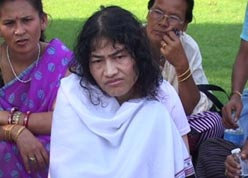 Irom Sharmila is a 34 year old ordinary woman from Manipur. Except that she has been carrying out a UNIQUE protest from the last 6 years, following all the tenets of Gandhigiri that we have just learnt about. And yet, nobody has heard about it!
Irom Sharmila is a 34 year old ordinary woman from Manipur. Except that she has been carrying out a UNIQUE protest from the last 6 years, following all the tenets of Gandhigiri that we have just learnt about. And yet, nobody has heard about it!Everywhere in the country, those who took to arms and unleashed mayhem were heard by the Government of India. Here is a woman staging an epic protest. she will not eat or drink until the Armed Forces Special Powers Act in Manipur is abrogated. She has not eaten or had a drop of water in the last six years! No one anywhere in the world has fought a struggle such as hers. Is Irom Sharmila to fail merely because she doesn’t wield a gun?
The Unlikley Outlaw
An ordinary November evening in Delhi. A slow halting voice breaks into your consciousness. “How shall I explain? It is not a punishment, but my bounden duty…” A
 haunting phrase in a haunting voice, made slow with pain yet magnetic in its moral force. “My bounden duty.” What can be bounden duty in an India bursting with the excitements of its economic boom?
haunting phrase in a haunting voice, made slow with pain yet magnetic in its moral force. “My bounden duty.” What can be bounden duty in an India bursting with the excitements of its economic boom?You are tempted to walk away. You are busy and the voice is not violent in its beckoning. But then an image starts to take shape. A frail, fair woman on a hospital bed. A tousled head of jet black curls. A plastic tube thrust into the nose. Slim, clean hands. Intent, almond eyes. And the halting, haunting voice. Speaking of bounden duty.
The story of Irom
That’s when the enormous story of Irom Sharmila begins to seep in. You are in the presence of something historic. Something unparalleled in the history of political protest anywhere in the world ever. Yet you have been oblivious of it. A hundred TV channels. An unprecedented age of media. Yet you are oblivious of it.
Six years of fasting!!
 Irom Sharmila, 34, has not eaten anything, or drunk a single drop of water for six years. Six years! She has been forcibly kept alive by a drip thrust down her nose by the Indian State. For six years, nothing solid has entered her body. Not a drop of water has touched her lips. She has not combed her hair. She cleans her teeth with dry cotton and her lips with dry spirit so she will not sully her fast. Her body is wasted inside. Her menstrual cycles have stopped. Yet she is resolute. Whenever she can, she removes the tube from her nose. It is her bounden duty, she says, to make her voice heard in “the most reasonable and peaceful way”.
Irom Sharmila, 34, has not eaten anything, or drunk a single drop of water for six years. Six years! She has been forcibly kept alive by a drip thrust down her nose by the Indian State. For six years, nothing solid has entered her body. Not a drop of water has touched her lips. She has not combed her hair. She cleans her teeth with dry cotton and her lips with dry spirit so she will not sully her fast. Her body is wasted inside. Her menstrual cycles have stopped. Yet she is resolute. Whenever she can, she removes the tube from her nose. It is her bounden duty, she says, to make her voice heard in “the most reasonable and peaceful way”.Yet we have remained oblivious to it. The Indian State has remained oblivious to it.
Protesting for Manipur
 For six years, Irom Sharmila has been protesting the Armed Forces Special Powers Act (1958) that has been imposed in Manipur and most of the Northeast since 1980. The Act allows the army to use force, shoot, or arrest anyone without warrant, on the mere suspicion that someone has committed or was about to commit a cognisable offence. The Act further prohibits any legal or judicial proceeding against army personnel without the previous sanction of the Central Government.
For six years, Irom Sharmila has been protesting the Armed Forces Special Powers Act (1958) that has been imposed in Manipur and most of the Northeast since 1980. The Act allows the army to use force, shoot, or arrest anyone without warrant, on the mere suspicion that someone has committed or was about to commit a cognisable offence. The Act further prohibits any legal or judicial proceeding against army personnel without the previous sanction of the Central Government.By all accounts, Manipur has been a wasteland of fear and counter-fear for decades. A kind of despair runs in its veins. When ordinary people leave their homes, they are uncertain if they will return. There is no electricity. The countryside is dark. Everyone is fair game. The army on one side, rival insurgents on the other. And the crippling disinterest of mainland India everywhere. Tell the State force is no way to deal with such unrest and it is unimpressed. Creativity and agility are not attributes governments understand.
For young Irom Sharmila, things came to a head on November 2, 2000. A day earlier, an insurgent group had bombed an army column. Enraged, the 8th Assam Rifles retaliated by gunning down 10 innocent civilians at a bus-stand in Malom. The local papers published brutal pictures of the bodies the next day, including one of a 62-year old woman, Leisangbam Ibetomi, and 18-year old Sinam Chandramani, a 1988 National Child Bravery Award winner. Extraordinarily stirred, on November 4, Irom (then 28) began her fast.
Irom's situation today
Six years later, sprawled in an icy white hospital corridor in Delhi on a cold November evening, Singhajit, Irom’s 48-year-old elder brother, says half-laughing, “How we reach here?” In the echo chambers of that plangent question lies the incredible story of Irom Sharmila and her journey. Much of that story must be intuited. Its tensile strength, its intense, almost preternatural act of imagination is not on easy display. The faraway hut in Imphal where it began. The capital city now and the might of the State ranged against them. The sister jailed inside her tiny hospital room, he outside with nothing but the clothes on his back, neither well versed in either English or Hindi, and a posse of policemen at the door.
But, in a sense, the power of Irom Sharmila’s story is in her pure, untutored vulnerability. She is not cosseted by any large, co-ordinated political movement. And if you are looking for the charismatic rhetoric of battle, the clichéd heat of heroism, you will be disappointed by the quiet woman in Room 57 in the New Private Ward of aiims in New Delhi. This 34-year-old’s satyagraha is not an intellectual construct. It is a deep human response to the cycle of death and violence she saw around her — almost a divine intuition. “I was shocked by the dead bodies of Malom on the front page,” Irom says in her clear, halting voice. “I realised there was no means to stop further violations by the armed forces. So I decided to fast.” On November 4, 2000, she sought her mother, Irom Shakhi’s blessing. “You will win your goal,” Shakhi said. And the stoic woman turned away.
Despite the fractured nature of Manipur’s polity, despite the deep ethnic divides and hostilities, there is a sense of a gathering endgame around Sharmila. Willy nilly, the moral force has acquired a kind of violence of its own. “Some decision has to come in this session of Parliament. Irom Sharmila is very revered now. If she is allowed to die, not just Manipur, the whole Northeast will boil over,” says Onil, an activist helping spearhead the Sharmila campaign in Delhi.
Support fropm Shirin Ebadi
 Curiously, it took Iranian Nobel Peace prize winner Shirin Ebadi to raise proportionate heat on Irom Sharmila in a recent trip. “If Sharmila dies, Parliament is directly responsible,” she thundered at a gathering of journalists. “If she dies, courts and judiciary are responsible, military is responsible… If she dies, the executive, the PM and President are responsible for doing nothing… If she dies, each one of you journalists is responsible because you did not do your duty…”
Curiously, it took Iranian Nobel Peace prize winner Shirin Ebadi to raise proportionate heat on Irom Sharmila in a recent trip. “If Sharmila dies, Parliament is directly responsible,” she thundered at a gathering of journalists. “If she dies, courts and judiciary are responsible, military is responsible… If she dies, the executive, the PM and President are responsible for doing nothing… If she dies, each one of you journalists is responsible because you did not do your duty…”Our Gandhigiri conscience
Yet we who have discussed Lage Raho Munnabhai and the great advent of Gandhigiri in India 2006 across channels and papers, have remained steadfastly oblivious to Irom.
It is a parable for our times.
If the story of Irom Sharmila does not make us pause, nothing will.
It is a story of extraordinariness.
Extraordinary will.
Extraordinary simplicity.
Extraordinary hope.
It is impossible to get yourself heard in our busy age of information overload. But if the story of Irom Sharmila will not make us pause, nothing will!!
Credits: Tehelka.com for the original story, abridged here.

3 comments:
Amazing, in this world and age of globalisation I have not heard one word about this woman. How resolute she is...
It is tragic really to think that all of this will lead to nothing. It can't be so...something good must come out of her efforts...inshallah.
I am afraid SS, she did not succeed much. She has recently had to abandon her pursuit in Delhi and return to Mizoram.
Well she set a good example, and I am sure her effort will, sooner or later, bear fruit.
m afraid to tell you mr.Abrahim that she is not from izoram but she is from manipur....
Post a Comment